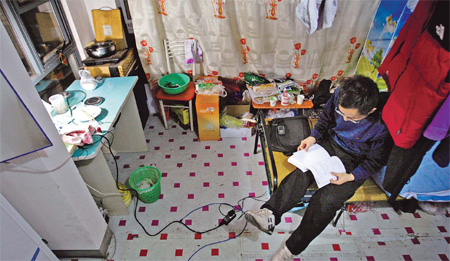City 'ants' face eviction from colonies
 |
|
Wang Hongya from Henan province shares an apartment with Wang Tao and 10 other tenants in the Tiantongyuan residential area, which is in northern Beijing. He arrived in the capital a year ago. |
Wang Tao lives in a 7-square-meter cubicle erected in a cramped three-bedroom apartment in north Beijing. He has 11 roommates.
"All of the tenants are young people. Some are unmarried couples and some, like me, are single," said the 27-year-old, who works in security at a State-owned company in Beijing. (He did not want his real name used for fear of upsetting his employers.)
Capsule apartments have grown extremely popular among the "ant tribe", the Chinese term for low-paid college graduates huddled together in cut-price city housing. Wang, who earns just 1,500 yuan ($220) a month, pays 650 yuan for a space in the capital's massive Tiantongyuan residential complex. For him and thousands of others, it is "the only affordable option".
Yet, come Feb 1, the practice of dividing rooms to house multiple tenants will be banned nationwide.
The regulation, which was unveiled by central authorities last month, has sparked intense debate, with some fearing the move could force low-paid white-collar workers out of cities and lead to a possible labor shortage.
Tenants and landlords are staying relaxed, however. Many of those who talked to China Daily said the ban is unlikely to make an impact on the huge demand. Policy and real estate experts agreed.
"No one would crush into a small room if they earned a decent living," said Wang. "If nobody can provide a legal place (that is affordable), I'll have to keep looking for something like I have right now."
 0
0 







Go to Forum >>0 Comments